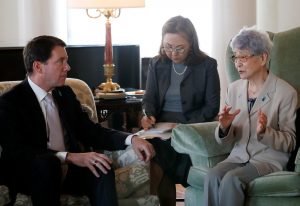
By Arshad Mohammed and John Walcott
WASHINGTON (Reuters) – By imposing new sanctions on Russia and condemning a suspected Russian chemical attack in Britain, Washington has hinted at a tougher stance toward Moscow despite President Donald Trump’s stated desire for better ties.
The U.S. Treasury slapped sanctions on 19 Russian citizens and five entities for election meddling and cyber attacks in the most significant steps the United States has taken against Russia since Trump took office amid U.S. intelligence agency allegations that Moscow tried to help him win the 2016 election.
While the Treasury put off targeting oligarchs and officials close to Russian President Vladimir Putin, it said further sanctions were coming and for the first time blamed Moscow for cyber attacks stretching back at least two years that targeted the U.S. power grid, including nuclear facilities.
After initially equivocating about a chemical attack on a former Russian double agent in Salisbury, England, the White House joined a statement by the leaders of Britain, France and Germany in which they said they “abhor the attack” and blamed it on Moscow.
Moscow has denied any involvement in the poisoning.
Thursday’s actions have caused some Russia analysts to ask whether the administration is taking a more confrontational stance despite Trump’s repeated statements in the election campaign that he wanted a better relationship with Moscow, his praise for Putin and apparent reluctance to criticize the Russian leader.
“I think we have hit an inflection point in the current administration’s approach towards Russia,” said a diplomat who spoke on condition of anonymity. “There has been a shift in balance.”
The diplomat attributed the evolution partly to a clash between U.S.-backed and Russian-backed forces in the Syrian city of Deir al-Zor in February; Russia pounding Syria’s eastern Ghouta enclave of anti-government rebels with air strikes during the past month; and Putin showing a video on March 1 of a weapon appearing to hover over what looked like a map of Florida, home to Trump’s Mar-a-Lago resort.
“Those three things, taken together, have caused a shift in analysis in parts … of the administration,” said the diplomat.
TRUMP EXASPERATED
While there was a sense at the White House that there has been a hardening of Trump’s view toward Russia, at least for now, it was unclear whether this represented a long-term shift.
A senior administration official said there was some feeling that the goodwill that Trump extended toward Russia when he took over has not been reciprocated and that the Russians do not want to have good relations with the United States.
This has exasperated Trump, who instructed his team to make sure the United States appeared to be in solidarity with Britain over the nerve agent attack.
Eugene Rumer, a former U.S. national intelligence officer for Russia, suggested Trump’s approach may ultimately be guided by Special Counsel Robert Mueller’s investigation into whether Russia meddled in the election campaign.
The Kremlin denies interfering. Mueller is also investigating any potential collusion between the Trump campaign and Moscow officials, something Trump denies.
“My hypothesis is … the White House stance on Russia is going to be determined to a large extent by how much they think the investigation threatens their political position,” Rumer said.
Officials from multiple U.S. agencies discussed next steps at a meeting on Thursday, with one aim being to avoid personally attacking Putin and taking in-your-face steps that could prompt retaliation.
In announcing Thursday’s sanctions, U.S. officials made clear more would follow.
“This is just one of a series of ongoing actions that we’re taking to counter Russian aggression,” one U.S. official told reporters. “There will be more to come, and we’re going to continue to employ our resources to combat malicious Russian activity and respond to nefarious attacks.”
Sergei Skripal, 66, and his daughter Yulia, 33, were found unconscious on a bench outside a shopping center on March 4 after being exposed to what the British authorities have identified as a military-grade, Soviet-era Novichok nerve agent.
Another U.S. official attributed the sharper edge to U.S. policy to increasingly brazen behavior by Russia in cyberspace and on the ground, culminating in the Salisbury attack.
This U.S. official, who spoke on condition of anonymity, also pointed to Russia’s refusal to restrain Syrian President Bashar al-Assad and the role of Russian “mercenaries” in Syria, now entering its eighth year of civil war.
The official said it was unclear if Trump himself saw Russia as an adversary but suggested Putin may have “overplayed his hand” by leaving Russian fingerprints on the hacking, the chemical attack, the deployment of ground-launched cruise missiles which the U.S. says violate an arms control treaty, and a March 1 speech on “invincible” Russian weaponry.
“If the president felt like Putin was one-upping him, not to mention stealing the limelight, then it wouldn’t be surprising that he would react,” the official said.
While more sanctions are expected, it was not clear if the Trump policy toward Russia was changing, especially given Trump’s unpredictability, said a third official, who is involved in talks on next steps.
“Tomorrow is another day,” the official said.
(Additional reporting by Steve Holland and Warren Strobel; Writing by Arshad Mohammed; Editing by Grant McCool and Paul Tait)










